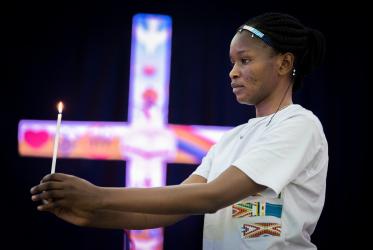By Marianne Ejdersten*
Rev. Dr Hielke Wolters is leaving the World Council of Churches (WCC) after serving for nine years - the last seven years as associate general secretary - but he is not leaving the ecumenical movement to which he has been dedicated since his student days. Officially is he going to retire, but only on the paper. He has many thoughts and plans to realize as he moves back to the Netherlands to serve, in one way or another, the church or the wider ecumenical movement. Wolters said to WCC News with a smile: “I’m open for any suggestion and I know that God will lead me in the right direction when that time comes.”
We meet in his office in the Ecumenical Centre in Geneva. Unfortunately I’m delayed by ten minutes because of urgent media requests. I apologize and my very well-organized colleague accepts my apology, and he is very well-prepared for the interview. He has a note in his hand. He is relaxed, but he has a very clear focus on the story we are going to tell to the fellowship. This is very important for him to contribute to the fellowship. Ecumenical relations is the core mission of Wolters's work and life. He is focused — a strategist on mission, business and administration - yet with a very warm and caring attitude.“If you work for the world, you have to be a bit of a strategist,” he said. His colleagues describe him as a very action-oriented reformed pastor with a big ecumenical heart. They say: “He is only worried when a process is too slow; that makes him frustrated.”
From Bangalore to urban mission
Let’s begin with his life story. Hielke Wolters comes from the Protestant Church in the Netherlands. A theologian and pastor, he has been engaged for many years in social justice, interreligious dialogue and development. His relation to the WCC began when he was a student, when he discovered quite early in his life the importance of mission strategies and the role of minority churches. He wrote a letter as a student to the WCC asking for advice: “Where should I go to do my PhD? I wish to go to an English-speaking University in an entirely different culture.” He received a response advising him to attend the United Theological College in Bangalore or the Serampore College near Calcutta. He decided to do his PhD in Bangalore and his main focus was the work of the late Indian theologian M.M. Thomas, moderator of the WCC from 1968 to 1975.
After working as a pastor in both rural and urban settings in The Netherlands , and later as director of the Dutch national ecumenical office for industrial and rural mission, he was appointed director of Stichting Oikos, an ecumenical institute that helps churches develop public awareness in the areas of international cooperation and sustainable development.
Long journey to define WCC’s new role
Wolters came to the WCC 1 July 2007, as the new WCC director for Justice, Diakonia and Responsibility for Creation. Wolters contributed with solid experience in combining theological reflection with results-oriented project management skills, and his experience and knowledge were highly appreciated after the assembly in Porto Alegre in 2006. The main programme challenge, he said in one of his first interviews in 2007, “will be to develop creative initiatives that can give hope to those fighting for survival on a daily basis; to promote solidarity between churches in spite of divisions due to economic globalization; and to support movements and initiatives promoting sustainable development in order to counter the effects of climate change.” After having been acting associate general secretary for programmes for a number of years, he was appointed as associate general secretary for Unity, Mission and Ecumenical Relations in 2011. He returned to his main field with a clear focus on mission strategies that would strengthen relations with member churches.
He was asked by former general secretary Rev. Dr Sam Kobia and then also by the new general secretary Rev. Dr Olav Fykse Tveit to coordinate the process to refocus and restructure the work of the WCC from Porto Alegre to Busan. He said: “It was a crucial time to define a clear role of the WCC in the ecumenical movement and the world at large. What should be the core mission for the WCC? We faced lot of challenges within the fellowship.”
Wolters mentioned especially the launch of the Ecumenical Advocacy Alliance and the formation of ACT Alliance, created by specialized ministries to take the lead in the area of humanitarian aid, development and advocacy.
Wolters said: “What should and could be the role of the WCC in a proliferated ecumenical movement? We also faced financial challenges and had to re-organize the work and try to prioritize more than before.”
Wolters emphasized: “All aspects and tensions of the world come together in Geneva. The World Council of Churches requires that diversity. The WCC lives that diversity as we are working on behalf of the member churches. We have a special task and mandate to take action, respecting the diversity in our consituency.”
The leadership under Rev. Dr Olav Fykse Tveit has a very clear focus - especially after the assembly in Busan 2013 - on the fellowship and work with people and partners of good will. The WCC has a new face as well as a more structured business model with plans formed through consultations with partners and management assessments.
Everything is grace
What are you most proud of? He is silent for a while and responds. "In my own tradition, we don’t use the word ‘proud.’ I grew up with the notion that basically everything is grace. But I will share some examples of what we have achieved in the WCC the last nine years from my perspective.”
One concrete example is the work with ecumenical partners and especially the specialized ministries. “We had regular meetings through the concept of Working Together and the Round Table to bring their representatives together to discuss the strategic planning for the WCC. In the last two years, we have also invited the leadership of the specialized ministries to Ecumenical Strategy Forums to deepen the discussion on the role of the WCC. The outcome from these discussions makes me happy. It is the same with the network of Ecumenical Officers of member churches; they are also very important and relevant for the future of the WCC.”
Role of mission is the challenge
Wolters also talks about the WCC’s new mission statement, Together Towards Life, presented at the WCC 10th Assembly in Busan, Republic of Korea, in 2013. The statement, he said, offers a new perspective on the situation and missionary challenges of churches in multi-religious as well as secularized societies.
Wolters refers to his own work in the field of industrial and urban mission. “For many churches, especially in Europe and North America, this is a pressing and vital issue. It is also a shared ecumenical challenge for all member churches of the WCC.”
“There is a great interest in mission in secular contexts among the member churches of the WCC,” said Wolters. “The leadership of these churches is fully aware of the urgent need to find new approaches. They see that their membership is aging and they struggle with reaching out to young people. So, any support they can get from the ecumenical movement and any space the ecumenical movement offers for joint reflection and action are very much welcomed.”
“One of the main challenges of mission in secular contexts is that a sensitivity for religious language is missing, at the individual as well as at the collective level,” explained Wolters.
“Speaking about God, referring to salvation, does not automatically lead to a fruitful conversation. It is necessary to understand the fundamental questions which secularized people have, for instance, about the dilemmas they are struggling with or their doubts about the meaning of life. The churches need to develop a new language and also new approaches to the sharing of life experiences if they want to convey in a convincing way the Christian message of faith, hope and love.”
Closer collaboration with Evangelicals
Wolters also wants to emphasize the collaboration with the World Evangelical Alliance (WEA) and the Global Christian Forum.
The leadership and representatives of the WEA and the WCC met on 20 May 2016 at the Ecumenical Institute in Bossey, Switzerland, to explore and discuss possible areas of future cooperation. Wolters explains: “That was the second official meeting between the leadership, this time with the WCC general secretary and WEA secretary general present. It was a historic moment, a new positive step, a new beginning.”
How did it start? Wolters responds: “In fact, during the coffee break at the Central Committee meeting in 2011. I had a short chat with one of the leaders of WEA and we decided to meet later on and discuss more in-depth.”
Wolters mentioned, at the same time, another positive development: the meeting between the leadership of the United Bible Society and the WCC in April 2016. “We are grateful that we can strengthen this important work in cooperation with the churches and organizations from the Catholic, Pentecostal and Evangelical traditions,” he added.
In November 2015, almost 150 participants from different Christian traditions met under the umbrella of the Global Christian Forum in Albania, hosted by His Beatitude Archbishop Anastasios, on the theme “Discrimination, persecution, martyrdom: Following Christ Together.” The event drew representatives of the churches and Christian communities who have faced discrimination and persecution in their local contexts.
Wolters said: “It is a strong sign of hope that churches and ecumenical organizations with such diverse backgrounds are ready to work together to support Christians who go through difficult times.” He said that “religious freedom is important for all of us, whether Christian, Muslim or adherents of any other religion.”
Wolters went on to say that this joint initiative is very much in line with the WCC’s efforts to accompany Christians and churches in countries like Syria, Iraq, Egypt and Nigeria.
WCC has to be relevant and make a difference
A final word: what is most important for the WCC at this moment?
Wolters responds with a clear message: “We have to be relevant. How is the WCC making a difference in the world? We have to put the churches in the centre; we have to strengthen the theology and the spirituality.”
He added: “We need all the ecumenical colours in the witness of justice and peace, to be a catalyst for change.”
Nine years later, Rev. Dr Hielke Wolters can look back with great joy and he is very grateful. He has been involved and responsible for many important processes, theological documents and historic meetings, and he is very pleased that the WCC now has a Strategic Plan bringing together all aspects of the council's work with a clear reporting structure to the executive and central committees. He is a real “apostle of strategies,” in both mission as well as in business and administration.
We wish him all the best for the future and look forward to meeting him in the ecumenical movement which is a lifelong journey. We will always keep him in mind as we hold ourselves accountable to our governing bodies and, most of all, people searching for hope across the world.
Thanks, Hielke, for your time to share your wisdom and your knowledge!
*By Marianne Ejdersten, director of communication at the World Council of Churches since 2015.
Related links:
Together towards Life: Mission and Evangelism in Changing Landscapes








